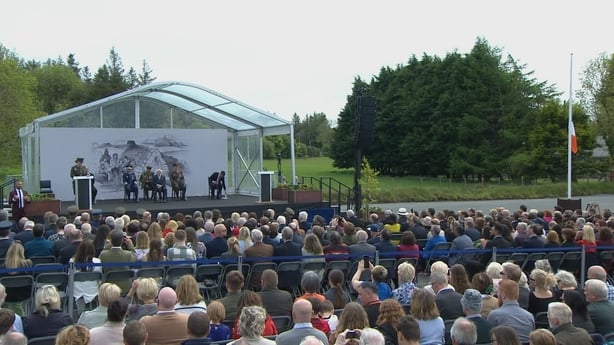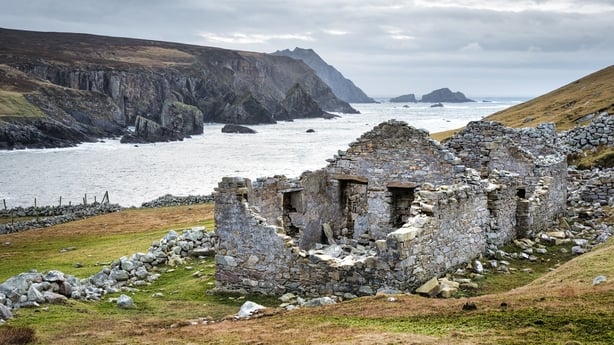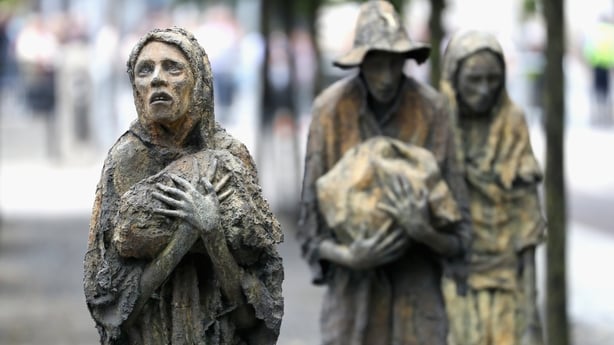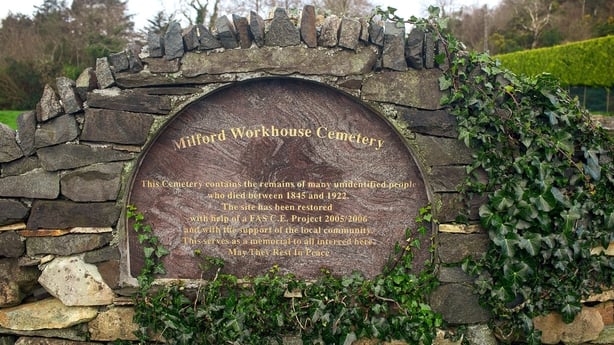Ireland has a moral duty to honour its commitments to those vulnerable and displaced who seek asylum and refuge on our shores, President Michael D Higgins has told the National Famine Commemoration.
Speaking at the commemoration event in Milford, Co Donegal, he said the parallels with the mass displacement caused by the famine 175 years ago must not be lost on us.
We need your consent to load this rte-player contentWe use rte-player to manage extra content that can set cookies on your device and collect data about your activity. Please review their details and accept them to load the content.Manage Preferences
Hundreds of people attended the wreath-laying ceremony and military honours on the site of the old workhouse and graveyard outside the town.
For the people of Donegal and further afield, the event was seen as an opportunity to reflect and commemorate all those who suffered or perished during the Great Famine.

President Higgins inspected the 28th Infantry Battalion Guard of Honour before his address to assembled guests this afternoon.
The President said the site of the old workhouse in Milford was an appropriate setting given the adversity endured by the people of Donegal in the face of poverty, hunger and emigration throughout the 19th century and in particular during the Great Hunger.
Minister of State Jack Chambers, who attended the commemoration on behalf of the Government, said: "It is particularly appropriate that today's event is being held here in Donegal, where the impact of the Great Famine and its legacy of emigration shaped the lives of its communities and people for too long.
"But today is also an opportunity to honour the courage and determination of those who were forced to leave these shores."
He added: "Despite the challenges and horrors they faced, they flourished and created a thriving diaspora which continues to maintain its connection to Ireland".
The legacy of the famine in Donegal is seen in so-called paupers' graveyards and in abandoned 19th century villages around the county, he said.

An estimated 40,000 people died or emigrated from Co Donegal alone from 1846 to 1851.
Cathaoirleach of Donegal County Council Cllr Liam Blaney said today was an honour for the local community.
He said: "We are honoured that Donegal will have the opportunity to host the National Famine Commemoration ceremony in 2023.
"The local community is very much engaged with the event and we will ensure a fitting commemoration of the catastrophic time in Irish history."

There were performances from Donegal musicians and singers including a rendition of 'Noreen Bawn' by Comhaltas Ceoltóirí Éireann Maoil Ruaidh.
Mairéad Ní Mhaonaigh sang 'Dún do Shúil' accompanied by Steve Cooney on guitar.
And there was a selection of famine stories read aloud from the 1930s School Folklore Collection.
"The National Famine Commemoration is a special opportunity for the current generation to acknowledge the suffering, death and anguish borne by the Irish people during that darkest time of our history," said Minister for Tourism, Culture, Arts, Gaeltacht, Sport and Media, Catherine Martin.
She applauded the work of the National Famine Commemoration Committee in ensuring that the events of An Gorta Mór are fittingly remembered and that those who emigrated and survived, along with their many descendants abroad, are justly celebrated.
The poverty and the agony of the Famine was also remembered in the poetry of Séamus Heaney.

'At a Potato Digging' was recited by students from Mulroy College and Loreto Community School in Milford.
Following prayers for the victims of the famine, led by Chaplain to the Defence Forces, Fr Jerry Carroll, President Higgins unveiled a commemorative stone and children from Creeslough and Ayr Hill national schools assisted in the planting of an oak tree to mark the occasion.
There was a solemn laying of wreaths followed by a minute of silence before the playing of Piper's Lament and Last Post.
The national flag was then raised to full mast and the ceremony concluded with the national anthem.
This is the third time the commemoration has taken place in Ulster.
'We live in a time that still allows famine to exist'
President Higgins referred to An Gorta Mór as a watershed in Irish history, describing it as the "greatest social catastrophe" in terms of mortality and suffering. He said the famine had profound consequences on demographics, politics, culture, religion, agriculture and industry.
In his address, President Higgins said: "The legacy of An Gorta Mór is complex, deep, wide, has many strands that have impacted on the Irish collective psyche as well as at the individual level. Its legacy is one of involuntary emigration, cultural loss, demoralisation and loss of confidence, both in terms of population and in terms of its impact on the Irish language and the marks this would have on the country, and in particular on Irish society, ramifications that still play out today on so many levels."
The President referred to what he called the "strong commitment" of the Irish people to humanitarian aid and relief, which he said was strongly related to Ireland's own past struggle with hunger, engrained in our collective memory.
"We make this commitment however, not only urged by memory as we may be, but because it is the right and moral thing to do. It is an example of the Irishness we wish to be known by, one grounded in decency, in ethical principles, taking our share of global responsibility."
He quoted Indian economist and philosopher, Amartya Sen, as one of many who have "correctly insisted" that famine is almost always a predictable and preventable occurrence if only there is the political will to prevent it.
We need your consent to load this rte-player contentWe use rte-player to manage extra content that can set cookies on your device and collect data about your activity. Please review their details and accept them to load the content.Manage Preferences
Yet, he said, we live in a time that still allows extreme hunger and famine to exist.
"The Horn of Africa has entered its sixth consecutive failed rainy season resulting in displacement of millions in Somalia, Ethiopia and Kenya who struggle to survive amid scarce water sources, hunger, insecurity and conflict."
President Higgins compared the dependence on the potato in 19th century Ireland to the reliance on wheat, rice and maize in contemporary eastern Africa. He said these staples were imported to a dangerous level of dependency.
"Such dependency with a range of local food sources being threatened by the consequences of climate change has led to mass hunger and starvation."
President Higgins said Ireland had a moral and ethical responsibility to support what he called "our global family in dire need".
He said sustainable solutions were needed to end all famines, wherever they occur on our shared, vulnerable planet and to provide a decisive response to climate change which he said was leading to an increased incidence of famines globally.
"Failure to act to prevent famines worldwide does not merely make an echo. It repeats and merely replicates the doctrines of inaction, moralism and laissez-faire policies that precipitated the Irish Famine, contributing to mass displacement such as that which we see now in Africa."
The President drew parallels with the famine and what he called the mass displacement it caused 175 years ago, saying it must not be lost on us.
"As we mark An Gorta Mór - that horrific period of starvation and disease in Ireland from 1845 to 1852 that constituted the country's greatest social disaster, a defining calamity that became part of the long story of betrayal and exploitation as part of a powerful empire and which led to the growing movement in Ireland for land reform and independence from the United Kingdom - let us do so within the prism of an ethical recall, in a manner that enables healing so that the painful scars of An Gorta Mór can be acknowledged, and in a lasting way, with painful and manifold legacies in time transacted for the benefit of us all, and in the name of an unbroken humanity."







